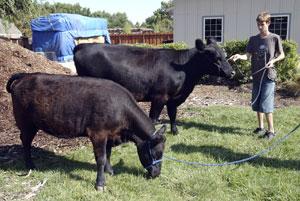
Fayner Posts: Here is just a portion of the story I found about mini cows. I know it has nothing to do with porno other than cows, like porno chicks, are whores. Check it ot or read the whole story at http://www.contracostatimes.com/mld/cctimes/news/15240628.htm?template=contentModules/printstory.jsp
Judy Dresser knows bigger is not always better, especially when it comes to livestock. On her Danville ranch live six miniature black Angus beef cows.
Dresser began breeding and selling the Australian-developed cattle for fun about two years ago and considers her designer beefers "part of the family."
Compared to standard-sized Angus, which run from about 1,000 to 1,200 pounds, Angus "Lowline" cattle weigh between 600 and 800 pounds. The Dresser Ranch currently is the only Lowline breeding operation in the Bay Area and one of only 11 in California, according to the American Lowline Registry of breeders.
Still, industry insiders say all types of diminutive cattle, of which about 26 different breeds exist — including mini-Herefords, Holsteins and Jerseys — are growing in popularity around the world, primarily as pets for moms with large back yards.
Although minicattle are raised for meat in some places, current U.S. prices would make it mighty pricey steak. A regular Angus may cost about $1,000, but Lowlines can run $3,000 to $15,000 at auction, Dresser said.
Keeping a pet cow might seem strange, but the minis can be handy, said Dresser, who points out, "I’ve never once had to cut the grass."
Interest in smaller bovines is flourishing as more families fan out to the suburbs and large tracts of ranch land become scarcer, said Richard Gradwohl. A retired marketing professor, he owns one of the largest and oldest miniature-cattle ranches and research facilities in the country.
In fact, about 80 percent of his stock is sold as pets. Others are bought by breeders for cattle shows, as miniature milkers and for all-natural farm-raised beef.
The founder of the Washington-state-based International Miniature Cattle Breeders Society, Gradwohl estimates the mini-market has grown about 10 percent to 20 percent per year since he got into the business about 35 years ago. He estimates there are about 1,000 of the minis in the United States.
Mostly women buy the minis, Gradwohl said. "They don’t want a big animal. They want something that’s cute, that’s affectionate, that they can treat as a pet."

